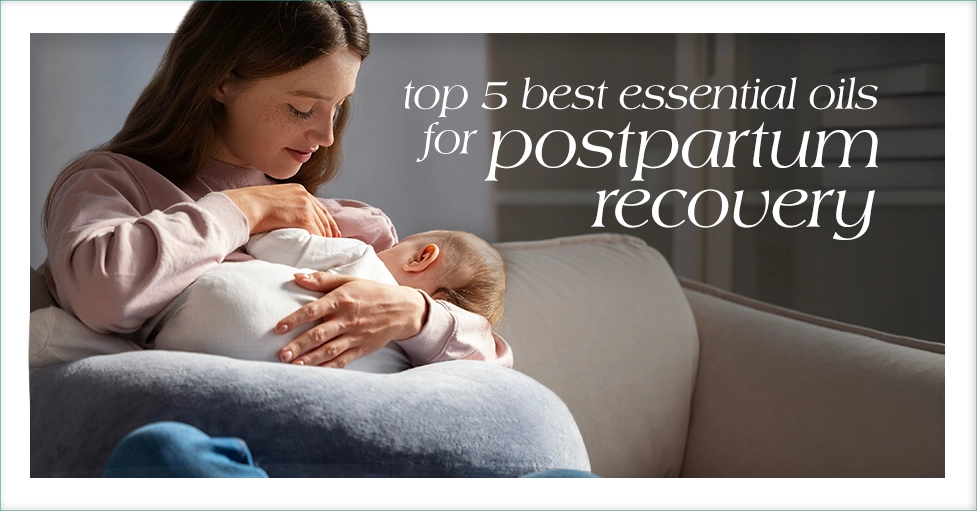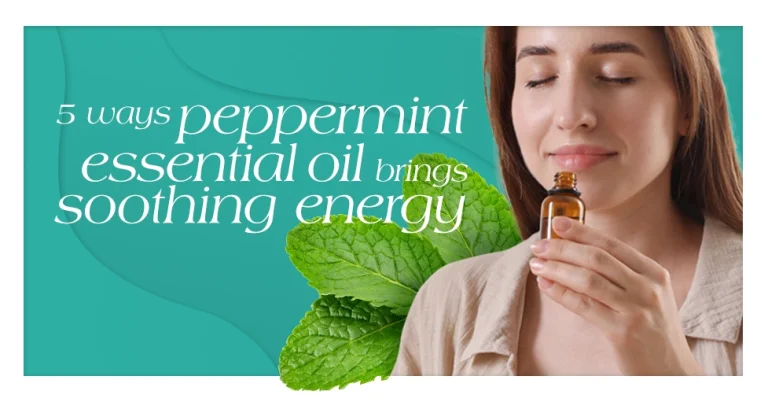Top 5 Best Essential Oils for Postpartum Recovery: Find Your Soothing Blend
If you’re in the postpartum phase, you may wonder what natural options can aid in your recovery. Look no further: we’ll present the best essential oils for postpartum that cater to healing, relaxation, and emotional balance, all while being safe for new moms. Expect clear, brief guidance on how each oil can support your post-birth healing journey.
Article Highlights
Postpartum Healing with Lavender

Lavender, the purple-hued beauty, isn’t just a feast for the eyes. Its essential oil, known for its soothing properties, is a godsend during the postpartum period. Lavender essential oil aids in skin recovery, offers calming aromatherapy, and supports restful sleep, making it an indispensable part of your essential oils for postpartum care routine.
Skin Recovery
Navigating the postpartum period often means dealing with skin discomfort and sensitivity in the pregnant body. Lavender essential oil, when diluted with a carrier oil, can effectively soothe C-section scars during pregnancy and the skin recovery process after childbirth when you apply topically. But its benefits aren’t limited to C-section mamas. The calming properties of lavender essential oil also contribute to alleviating perineal discomfort when used appropriately in dilution and you apply topically.
Imagine the relief of applying a soothing blend to your tender skin, feeling the gentleness of nature’s touch as it nurtures you back to health. A pain relief blend for post-contraction pain can be made using lavender essential oil with white fir essential oil and fractionated coconut oil. This blend, when you apply topically to the abdomen, offers comforting relief to the pregnant body, providing a gentle, nurturing touch during the delicate postpartum recovery phase.
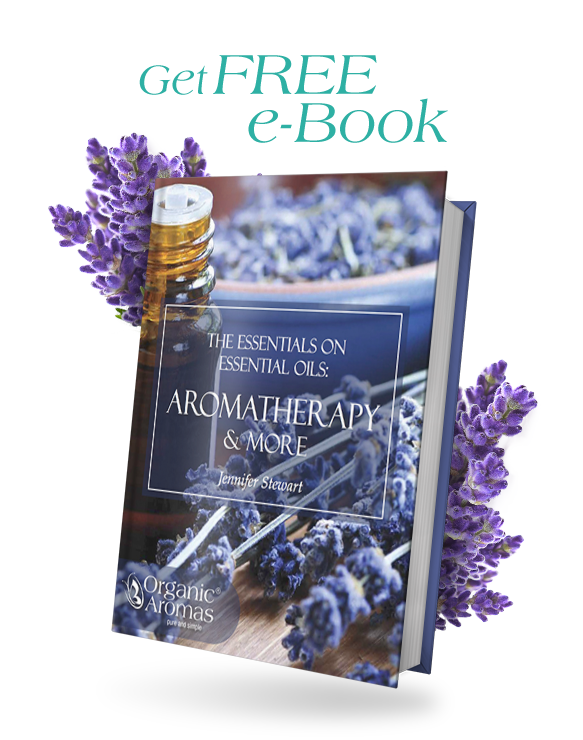
Sign Up to Get Your FREE
e-Book Here…
Diffuse Essential Oils – Calming Aromatherapy
In the whirlwind of early motherhood, moments of calm can seem elusive. Here’s where lavender essential oil steps in as your calming ally. A few drops in your diffuser and your space can transform into a serene haven. Lavender oil aromatherapy can improve the psychological health of postpartum women, evidenced by better mood statuses and lower distress scores.
Inhaling lavender essential oil helps to calm the body and mind, creating a relaxed environment conducive to unwinding and bonding with the baby. But remember, when diffusing essential oils, such as lavender, around a breastfeeding infant, it’s important to:
- Consult with a healthcare provider
- Use the oils in a well-ventilated space
- Consider using a smaller amount of oil or diffusing intermittently to be mindful of the infant’s sensitive sense of smell.
Restful Sleep Support
A good night’s sleep is a precious commodity in the postpartum period. But lavender essential oil might just be the secret to reclaiming those precious Z’s. Lavender aromatherapy can significantly improve sleep quality for postpartum women. Diffusing a couple drops of lavender before bed and or even using a spray bottle on your pillow is a recommended method for postpartum women.
For a relaxing bath that supports postpartum recovery, a blend of 3 drops Mandarin, 2 drops Lavender, and 2 drops Roman Chamomile into the bath water. Clary Sage aromatherapy has also been found to reduce postpartum fatigue and physical pain, contributing significantly to the overall well-being of new mothers.
Revitalizing Peppermint: A Postpartum Energy Boost
As an invigorating agent, peppermint oil can give you that much-needed helpful energy boost postpartum. The refreshing scent of menthol in peppermint oil not only stimulates the senses but also enhances focus and mood, offering an all-natural pick-me-up to combat postpartum fatigue.
Nausea Relief
Postpartum nausea can be a challenging hurdle, but peppermint oil might just be your trusty ally. Whether inhaled or applied topically to pulse points, peppermint oil helps alleviate postpartum nausea. Imagine inhaling the crisp, minty aroma of peppermint, its invigorating scent cutting through the nausea and bringing you back to equilibrium.
Not only does it offer relief, but the refreshing scent of great oil can also be a welcome distraction, taking your mind off the discomfort and helping you focus on the joy of your new journey. Indeed, peppermint oil proves that powerful remedies often come in small packages.
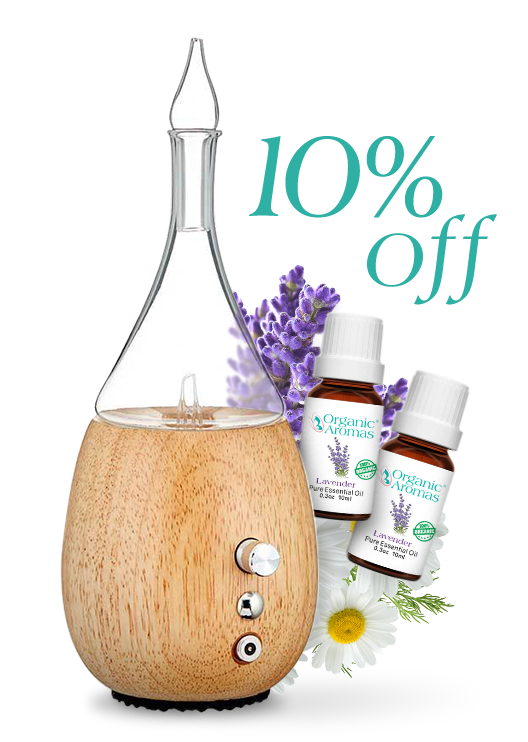
Join Now and Get a Coupon for %10 Off!
Lactation Considerations
While peppermint oil offers numerous benefits, it’s important to tread carefully when it comes to lactation. Before introducing peppermint oil into your routine, it’s recommended to consult with a healthcare professional to ensure it doesn’t negatively affect milk supply.
Peppermint oil should be used in moderation during the lactation period, as overuse may lead to reduced breast milk production. Some cultures use peppermint oil to enhance the taste and quality of breast milk, but it’s also known to suppress milk production. A diluted blend of peppermint oil can serve as a milk production suppressant if needed, but always remember to consult your healthcare provider before use.
Gentle Geranium for Hormonal Balance

Meet Geranium, your gentle companion for postpartum hormonal balance. With its ability to regulate hormone production and secretion, geranium essential oil is beneficial for women experiencing hormonal fluctuations after childbirth.
Emotional Well-being
Motherhood is a rollercoaster of emotions, and it’s perfectly normal for pregnant women to experience moments of anxiety and stress. That’s where Geranium essential oil steps in. With its positive mood-enhancing effects, Geranium oil when applied to the pulse points can help alleviate stress and anxiety in new mothers, aiding emotional health during postpartum.
It’s like having your personal emotional support system, right in your diffuser. A few drops can transform your space during labor into a sanctuary of calm, helping you navigate the ups and downs of labor and early motherhood with grace and resilience.
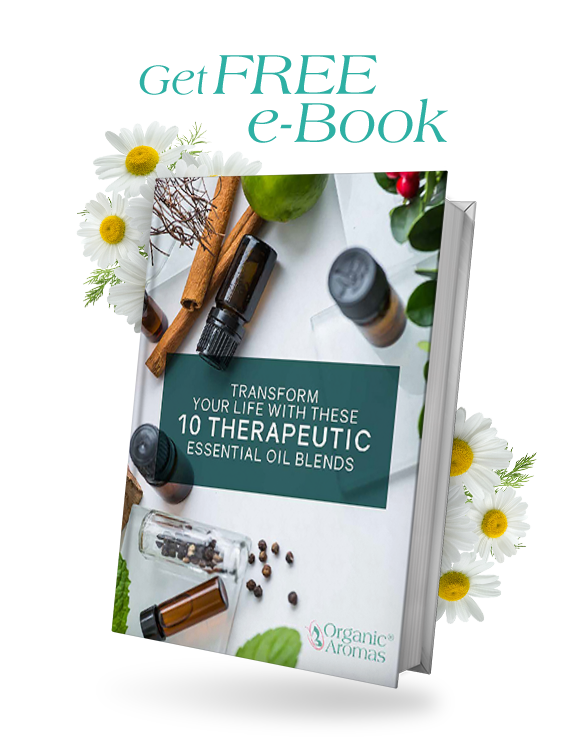
Sign Up to Get Your FREE Essential Oils e-Book Here
Skin Elasticity
Post-pregnancy skin can often feel stretched and loose. But with Geranium essential oil, you can reclaim your skin’s elasticity. Geranium oil has properties that can tighten and tone the skin, aiding in the recovery of skin elasticity lost during pregnancy.
Not only does it increase elasticity, but Geranium essential oil’s therapeutic applications also extend to the treatment of aging, wrinkled, and dry skin, contributing to improved skin appearance after childbirth. With its capacity to enhance dermal elasticity and appearance, Geranium essential oil is a helpful addition to postpartum skincare routines.
Frankincense Oil: Your Postpartum Serenity Companion
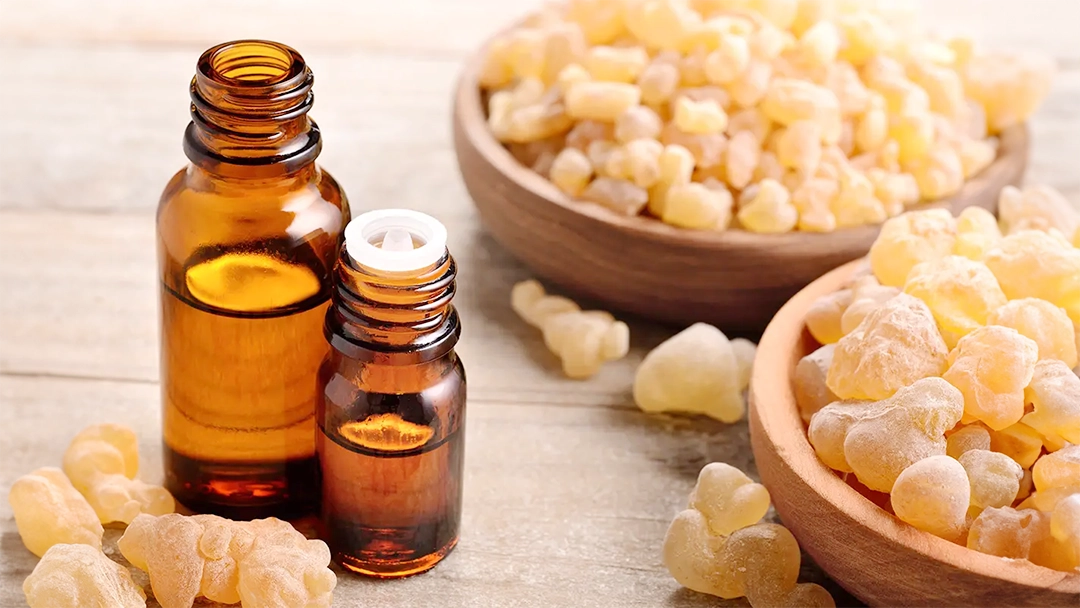
Frankincense oil, often hailed as the “king of oils”, can be your serene companion during the postpartum period. With its unique ability to:
- Promote a sense of peace and well-being
- Facilitate serenity for new mothers
- Provide immune system support
- Enhance focus during meditation
Frankincense oil and clary sage oils are valuable tools for new mothers, as they are among the birth essential oils.
Immune System Support
In the postpartum period, a robust immune system is crucial, as well as maintaining a healthy central nervous system. Frankincense oil, when diffused into the air, has immune-boosting properties that are particularly beneficial during this time.
Adding Frankincense oil to a warm bath can enhance the immune response while providing a soothing experience for postpartum mothers. Imagine soaking in the warm water, the woody, earthy aroma of Frankincense filling the air, as your body and mind succumb to relaxation.

Sign Up to Get Your FREE Essential Oils e-Book Here
Focus and Meditation
Postpartum recovery isn’t just about physical healing. It’s also about finding mental and emotional balance amidst the new demands of motherhood. Incorporating Frankincense oil into meditation can help a mother maintain her focus and energy amidst these many new life demands.
Using Frankincense oil during meditation or quiet moments can contribute greatly to the overall well-being of a postpartum mother by helping her stay centered and attentive. It’s like finding a quiet sanctuary amid the chaos of life, a place where you can retreat to, regroup, and emerge stronger.
Tea Tree: The Antiseptic Ally

Tea tree oil, your antiseptic ally, is a potent weapon against postpartum infections. With its potent antiseptic properties, Tea tree oil plays a crucial role in postpartum care, ensuring the prevention of infection, and offering a natural solution for home cleaning.
Infection Prevention
Wound care is a critical aspect of postpartum recovery. Tea tree oil, known for its antiseptic properties, can help prevent infections in postpartum wounds. It’s like having a protective shield, guarding your body against potential infections and promoting the healing process.
Interestingly, tea tree oil can also support healing in C-section wounds. The Healing Body Spritz Blend with tea tree oil is designed to heal and calm post-delivery tears and inflammation, making it a valuable addition to your postpartum care routine.
Home Cleaning Solutions
Cleanliness is especially crucial when there’s a newborn in the house, as their human body is more susceptible to infections. But with Tea tree oil, you can create safe home cleaning solutions that are effective and non-toxic.
Consider making a DIY cleaning spray with a base of distilled water, white vinegar, and a few drops of tea tree oil. It can be used for cleaning and disinfecting surfaces, ensuring a safe and clean environment for you and your baby.
You can also use a mixture of tea tree oil and baking soda as one of the natural remedies for scrubbing surfaces, offering a chemical-free way to clean the home.
Top 5 Best Essential Oils for Postpartum Recovery
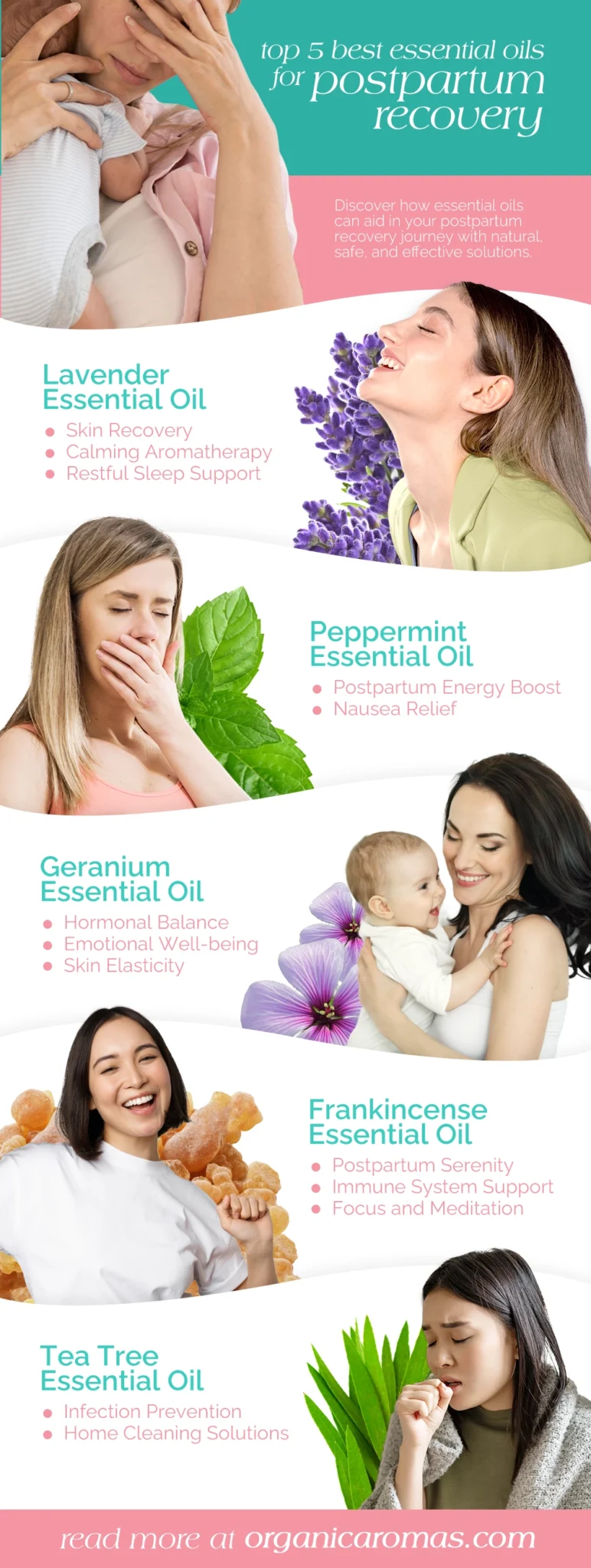
Crafting Your Own Postpartum Essential Oil Blends
Having someone create a personalized postpartum essential oil blend can be an empowering part of your recovery journey. Crafting these blends allows for adjustments according to individual needs and preferences, which can enhance the healing, relaxation, and overall comfort during postpartum recovery.
Blend Recipes
Blend recipes for postpartum recovery incorporate essential oils with soothing, uplifting, and grounding properties to assist new mothers. The Postpartum Soothing Spray recipe, for instance, combines witch hazel, aloe vera, and essential oils such as lavender and frankincense, designed to heal and calm post-delivery tears and inflammation.
For postpartum pain relief, a roller bottle mixture using lavender, white fir essential oils, and fractionated coconut oil can be applied topically to soothe discomfort. A relaxing sleep-inducing blend can be created with orange or bergamot and lavender essential oils together, while a Muscle Soothing Blend may include Copaiba, Wintergreen, or Eucalyptus oils diluted in a carrier oil for post-delivery muscle relief.

Join Our Exclusive Member Club to get Big Discounts!
Safe Usage Practices
Avoid Diffusing Essential Oils Around Infants
Although essential oils can offer numerous benefits to many women during and after pregnancy, it’s crucial to prioritize your baby’s health. Newborns are in a delicate stage of physical and immune system development, highly sensitive to their surroundings. To protect your newborn baby from the risk of overexposure, it’s advisable to refrain from diffusing essential oils in the same room as your baby.
Diluting Essential Oils
While essential oils offer numerous benefits, it’s important to use them safely. Essential oils should not be used in a dilution higher than 5% for topical applications to minimize the risk of skin sensitivity and adverse reactions. For applications on the face or for sensitive areas, a dilution rate of 1% or less is recommended.
Carrier oils, such as fractionated coconut oil, are essential for diluting essential oils to reduce skin sensitivity and enhance the aroma’s longevity on the skin. When choosing essential oils, remember that to apply essential oils topically, diluted essential oil blends should be stored in appropriate containers like roller bottles for targeted topical application and dropper bottles for easy use in massage oils. Additionally, to diffuse essential oils, consider using a nebulizing diffuser for optimal aromatic benefits with your favorite oils.
Seeking Help in Postpartum: A Vital Step
Navigating the postpartum period can be incredibly challenging, with emotions ranging widely. If you find yourself grappling with thoughts of self-harm or suicide, it’s crucial to recognize this as a clear signal to seek help immediately.
You’re Not Alone: Remember, experiencing such thoughts does not diminish your worth as a parent. These feelings are symptoms of a treatable condition, and with the right support, you can overcome them.
Immediate Actions:
- Emergency Services: If there’s an immediate danger, call emergency services without delay.
- Contact Healthcare Providers: Reach out to your doctor or a mental health professional who can guide you towards the necessary treatment.
- Online Support Groups: Join an online support group and speak with professionals for immediate support.
- Lean on Your Support Network: Don’t hesitate to share your feelings with trusted friends or family members.
Wrapping it Up
We’ve explored the world of essential- oils for postpartum, and their invaluable benefits during postpartum recovery. From Lavender’s soothing properties to Peppermint’s energizing effects, from Geranium’s skin-enhancing capabilities to Frankincense’s focus-enhancing properties, and from Tea Tree’s antiseptic benefits to creating your personalized blends, essential- oils for postpartum offer a holistic approach to postpartum care. As you hold your precious bundle, remember to also take care of yourself, because a happy mom makes a happy baby!
Frequently Asked Questions (FAQs)
What essential oils are good for postpartum?
Lavender, jasmine, ylang-ylang, sandalwood, bergamot, rose, Frankincense, and Helichrysum essential oils are good for postpartum recovery, as they can help manage depression, anxiety, and soothe and support the skin during this period. Try incorporating these essential oils into your postpartum self-care routine for added support.
What essential oils to use after birth bath?
After giving birth, try using essential oils like Lavender, Frankincense, and Chamomile in your bath to soothe and support your skin. These oils can also help with perineal discomfort and provide a world of benefits after birth itself.
Can I use essential oils directly on my skin during the postpartum period?
It’s best to dilute essential oils with a carrier oil before applying them to your skin during the postpartum period to reduce the risk of skin sensitivity and adverse reactions.
Can I use peppermint oil while breastfeeding?
Consult with a healthcare professional before using peppermint oil while breastfeeding, as it could impact milk supply.
Can I use essential oils around my baby?
Consult with a healthcare provider before using essential oils around your baby, and ensure you use the oils in a well-ventilated space to be mindful of your baby’s sensitivity. Be cautious and use smaller amounts or diffuse oils intermittently.

